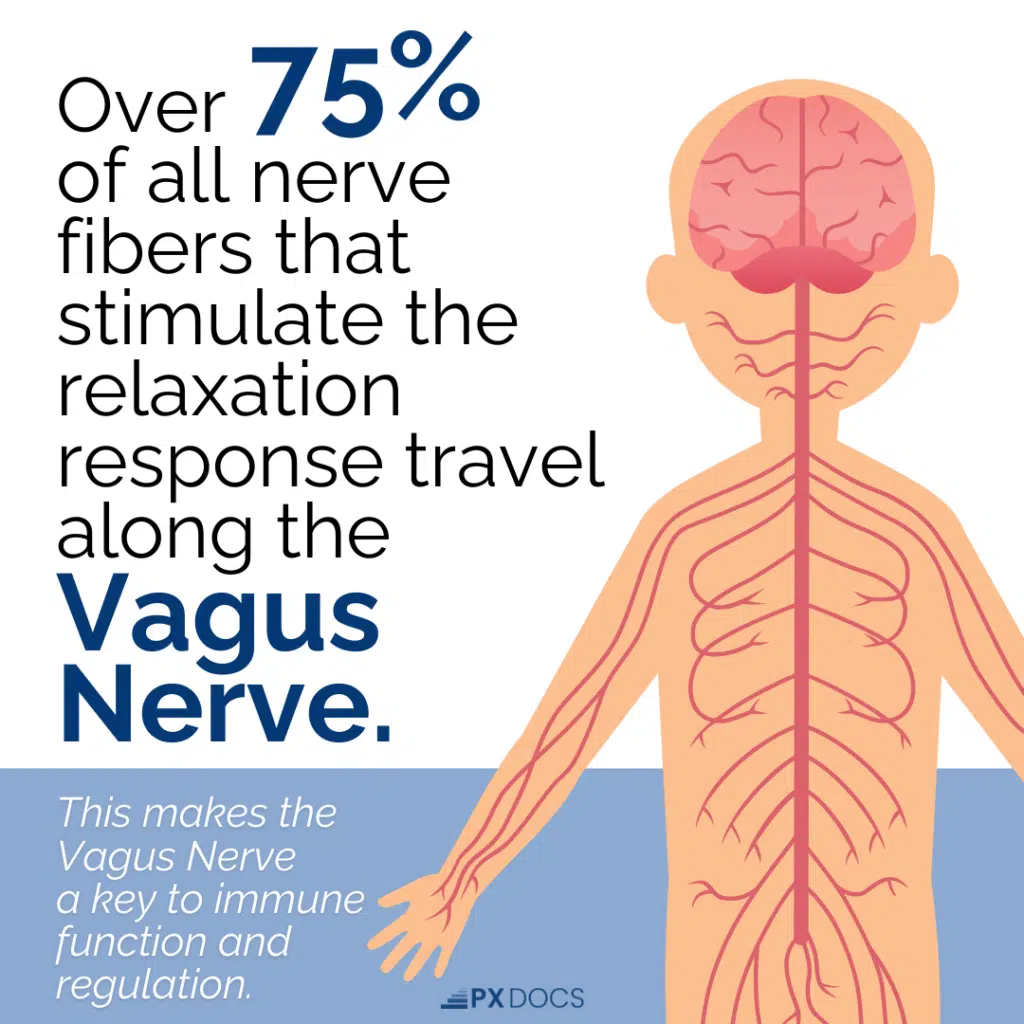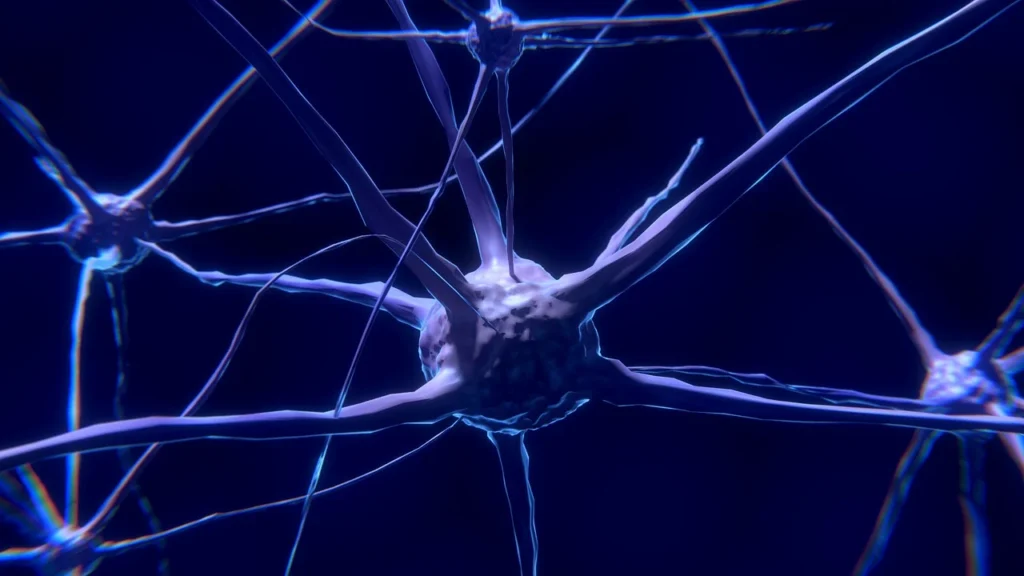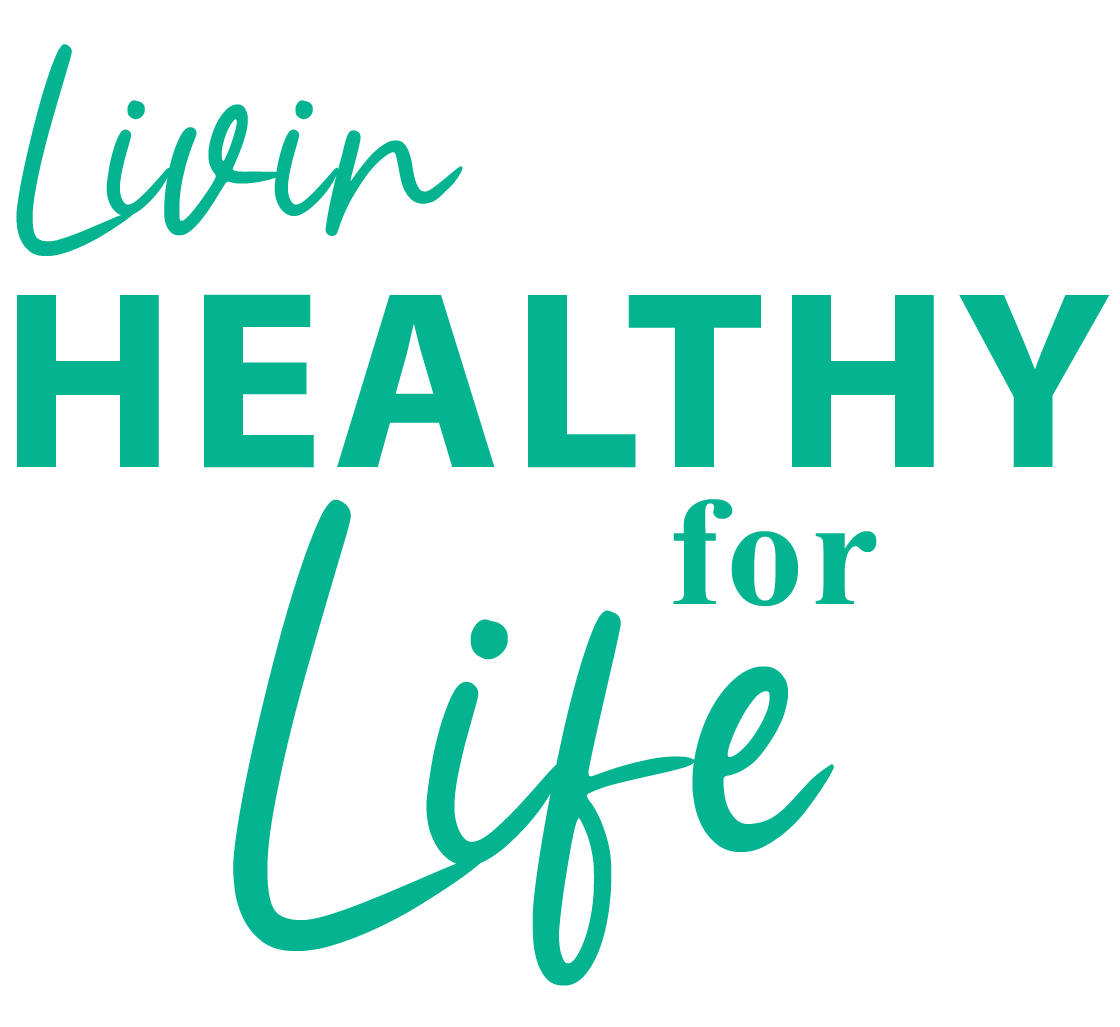Introduction to the Vagus Nerve
The vagus nerve, one of the most significant components of the autonomic nervous system, serves as a crucial communication pathway that links the brain to various organs, including the heart, lungs, and digestive system. As the longest cranial nerve, the vagus nerve extends from the brainstem down through the neck and into the thoracic and abdominal cavities. Its extensive reach underscores its vital role in fostering the communication between the brain and the organ systems, coordinating diverse bodily functions essential for maintaining homeostasis.
The vagus nerve is primarily responsible for the parasympathetic response, which is often referred to as the “rest and digest” state. This is in contrast to the sympathetic nervous system, associated with the “fight or flight” response. When activated, the vagus nerve promotes relaxation and recovery, supporting functions such as heart rate regulation and digestion, thereby encouraging a calm state of mind and body. This dual role is critical as it influences not only physiological functions but also emotional well-being.
Recent research has illuminated the vagus nerve’s involvement in various bodily processes, suggesting its influence extends beyond mere organ communication. For instance, techniques aimed at stimulating the vagus nerve, such as deep breathing and certain yogic practices, have been linked to improved mental health and emotional resilience. This connection brings awareness to the emerging wellness practices associated with initiatives focused on the vagus nerve, such as the concept of vaguvibe, as promoted by health advocates like Mark Fox under the umbrella of Resona Health.
This foundation sets the stage for a deeper exploration into the importance of the vagus nerve and its potential to unlock your body’s hidden capabilities. Understanding its functions lays the groundwork for appreciating the therapeutic advantages that can be harnessed through conscious engagement with this extraordinary nerve.

Anatomy of the Vagus Nerve
The vagus nerve, also known as cranial nerve X, originates from the brainstem, specifically the medulla oblongata. It is distinguished as the longest cranial nerve in the body and extends its influence from the head and neck region all the way down to the abdomen. As part of the autonomic nervous system, the vagus nerve plays a critical role in regulating involuntary body functions, such as heart rate, digestion, and respiratory rate.
After its origin, the vagus nerve exits the skull through the jugular foramen, where it then descends into the neck. Here, it branches into several vital pathways, innervating structures such as the larynx and pharynx, which are crucial for voice and swallowing mechanisms. The nerve continues downward, traversing the thorax, and providing extensive innervation to the heart and lungs. Its impact on cardiac function cannot be overlooked, as it helps to modulate heart rate through parasympathetic control.
As it further descends into the abdomen, the vagus nerve branches out to innervate various organs, including the stomach, pancreas, and intestines, facilitating important digestive processes. This extensive network of connections underscores the significance of the vagus nerve in maintaining homeostasis and overall health. The activation of the vagus nerve, often referred to as the “vagal tone,” has been linked to improved gut health and emotional well-being. Mark Fox from Resona Health emphasizes the importance of stimulating the vagus nerve to harness its therapeutic potential, which is evident in tools like the innovative Vaguvibe device. Understanding the anatomical pathways and functions of the vagus nerve helps to unlock its hidden potential in promoting holistic wellness.
Functions and Role of the Vagus Nerve
The vagus nerve, a crucial component of the parasympathetic nervous system, plays an essential role in a wide array of physiological functions. It is responsible for regulating heart rate, digestion, respiratory rate, and immune response, making it a key player in maintaining homeostasis within the body. The vagal pathways extend from the brainstem down to the abdomen, impacting various organs and systems. Its involvement in heart rate regulation, for instance, allows for a decrease in heart rate during periods of rest, thereby promoting relaxation and recovery.
In terms of digestive function, the vagus nerve stimulates the production of digestive enzymes and gastric acids, facilitating efficient food breakdown and nutrient absorption. This link between the vagus nerve and gastrointestinal health highlights its significance in digestion. Moreover, the vagus nerve’s influence extends to the respiratory system by modulating breathing patterns, ensuring adequate oxygen supply to the body while promoting a relaxed state, which can alleviate anxiety and stress.
The vagus nerve is also associated with the body’s immune response. Its ability to communicate with the immune system illustrates how nervous and immune systems interact, significantly impacting inflammation and overall health. Furthermore, the vagus nerve plays a psychological role, contributing to emotional regulation and mental well-being. Research has revealed that stimulation of the vagus nerve can enhance mood and alleviate depressive symptoms, underscoring its potential in therapeutic settings.
Overall, understanding the functions of the vagus nerve is imperative for recognizing its comprehensive role in health and well-being. From influencing physiological processes to supporting mental health, the vagus nerve is integral to the modalities of healing and recovery. By prioritizing vagal health, as emphasized by experts like Mark Fox and institutions such as Resona Health, individuals can unlock various benefits, fostering a holistic approach to wellness that resonates throughout the body.

The Vagus Nerve and the Mind-Body Connection
The vagus nerve, often regarded as the primary component of the parasympathetic nervous system, plays a crucial role in fostering communication between the brain and various bodily systems. This intricate connection has profound implications for emotional regulation and stress response, making it a central aspect of both psychological and physiological health. The importance of the vagus nerve extends beyond mere anatomical significance; it is integral to maintaining a balanced interplay between the mind and body.
One significant aspect of the vagus nerve is its role in the gut-brain axis, a bi-directional communication pathway that links the gastrointestinal system with the central nervous system. Resona Health emphasizes the relevance of this connection, as emerging research indicates that the vagus nerve can influence our emotional state and overall mental well-being through gut health. For instance, the presence of beneficial gut microbiota can stimulate the vagus nerve, potentially activating pathways that promote feelings of calmness and contentment.
Mark Fox, a notable researcher in this domain, has highlighted how the vagus nerve’s extensive reach throughout the body allows it to mediate physiological responses to stress. When confronted with stressors, the vagus nerve can modulate heart rate, respiratory function, and even digestive processes, thereby influencing a person’s emotional reactions. Consequently, the vagus nerve is a critical player in how we cope with stress, showcasing its essential role in maintaining emotional equilibrium.
The relationship between the vagus nerve and mental health has prompted interest in therapies aimed at stimulating this nerve to alleviate conditions such as anxiety and depression. Techniques like deep breathing, meditation, and even specific exercises, such as the vaguvibe, have been advocated as potential methods to enhance vagal tone and improve emotional well-being. Ultimately, understanding the vagus nerve’s impact on the mind-body connection opens avenues for holistic approaches to wellness.
Vagus Nerve Stimulation and Health Benefits
The vagus nerve is a crucial component of the autonomic nervous system, playing a significant role in regulating various bodily functions. Vagus nerve stimulation (VNS) has emerged as a therapeutic approach for enhancing overall health and well-being. Various methods can be employed to stimulate this nerve, including deep breathing exercises, yoga, and other mindfulness practices. These techniques not only promote relaxation but also encourage a deeper connection between the mind and body, fostering a state of calmness.
Deep breathing exercises are among the simplest yet most effective ways to activate the vagus nerve. By focusing on slow, controlled breaths, individuals can initiate the relaxation response, significantly reducing stress levels. This practice can lower heart rates and enhance feelings of tranquility, illustrating the intricate relationship between breath and vagal function. Additionally, yoga has been shown to have a profound impact on the autonomic nervous system. The combination of physical postures, breath control, and meditation in yoga encourages vagus nerve activation, which may contribute to improved mental health outcomes.
Research indicates that individuals who engage in regular vagus nerve-stimulating activities experience significant reductions in anxiety and depression. These therapeutic techniques can enhance emotional resilience, resulting in an improved quality of life. Furthermore, many individuals report increased feelings of well-being and decreased symptoms of mood disorders. Organizations such as Resona Health advocate for these holistic approaches, emphasizing the importance of integrating mindfulness into daily routines for sustainable health improvements.
Mark Fox and other experts in the field of neurobiology have studied the link between the vagus nerve and emotional regulation. Their findings reinforce the idea that by prioritizing techniques known to promote vagal tone, individuals can unlock their body’s hidden potential. As interest in vagus nerve stimulation grows, its implications for mental and physical health remain promising.
Vagus Nerve Dysfunction and Its Implications
The vagus nerve, a vital component of the autonomic nervous system, plays an essential role in regulating numerous bodily functions, including digestion, heart rate, and mood. When this nerve is not functioning optimally, it can lead to a range of health issues that significantly impact an individual’s overall well-being. Vagus nerve dysfunction can manifest in various ways, often presenting as digestive disorders. For instance, conditions such as irritable bowel syndrome (IBS) and gastroparesis can arise due to impaired vagal signaling, which contributes to disturbances in gastric motility and secretion.
Additionally, the dysfunction of the vagus nerve is linked to increased levels of inflammation within the body. This is largely due to the nerve’s role in regulating the immune response. A diminished vagal tone can lead to an overactive inflammatory response, potentially resulting in chronic inflammatory conditions such as rheumatoid arthritis or inflammatory bowel disease. As the vagus nerve helps maintain the balance between the sympathetic and parasympathetic nervous systems, its dysfunction can disrupt this balance, leading to further complications.
Moreover, the implications of vagus nerve dysfunction extend into the realm of mental health. Individuals may experience heightened anxiety, depression, or stress reactions when the vagus nerve fails to perform adequately. The relationship between the vagus nerve and the brain is bidirectional; therefore, any dysfunction can have profound effects on emotional regulation and mental clarity. Mark Fox and Resona Health emphasize the importance of addressing these concerns, proposing approaches to support and enhance vagal function through practices like deep breathing exercises and mindfulness techniques, often encapsulated in the concept of ‘vaguvibe.’ These holistic strategies can potentially mitigate the negative implications of vagus nerve dysfunction.

Research and Studies on the Vagus Nerve
The vagus nerve, known as the tenth cranial nerve, has garnered significant attention in the field of health research due to its extensive influence on various bodily functions. Historically, studies have pointed out the vagus nerve’s role in regulating heart rate, digestion, and even mood. However, recent research conducted by organizations such as Resona Health and Mark Fox has expanded our understanding of this fascinating nerve far beyond its traditional functions.
One groundbreaking area of research is the relationship between the vagus nerve and the body’s inflammatory responses. Studies published in prominent health journals have shown that stimulation of the vagus nerve can reduce inflammation, which is a contributing factor in numerous chronic diseases. This discovery has opened pathways for innovative therapeutic interventions, including the development of devices that stimulate the vagus nerve, such as the well-known VaguVibe device. This device aims to enhance vagal tone, providing relief for conditions ranging from rheumatoid arthritis to inflammatory bowel disease.
Another significant aspect of vagus nerve research is its impact on mental health. Recent studies indicate a strong link between vagal tone and psychiatric disorders, including depression and anxiety. Researchers have found that individuals with higher vagal activity tend to exhibit better emotional regulation and resilience. This knowledge emphasizes the importance of nurturing the vagus nerve health to enhance emotional well-being and overall health, potentially leading to new treatment modalities combined with holistic practices.
Overall, both historical context and contemporary studies underscore the vagus nerve’s essential role in health management. The growing body of research surrounding the vagus nerve not only supports its relevance in disease management but also highlights its potential as a compelling area for future inquiry and therapeutic development.
Practical Ways to Support Vagus Nerve Health
Supporting the health of the vagus nerve is crucial for overall well-being, as it plays a pivotal role in regulating the autonomic nervous system, particularly during stress and recovery. By incorporating certain lifestyle changes, dietary adjustments, and specific exercises, individuals can enhance their vagal tone and promote better health outcomes.
One of the most effective lifestyle changes involves the practice of deep and slow breathing exercises. Engaging in deep diaphragmatic breathing stimulates the vagus nerve, encouraging relaxation and reducing stress levels. It is recommended to practice this form of breathing for a few minutes several times a day, especially during moments of anxiety or tension. Mindfulness meditation is another beneficial practice; it not only calms the mind but also fosters a deeper connection with bodily sensations, which can boost vagus nerve function.
Dietary choices also play an essential role in supporting vagus nerve health. Incorporating foods rich in omega-3 fatty acids, such as fatty fish and walnuts, can promote resilience of the nervous system. Fermented foods like yogurt and kimchi, which contain probiotics, may positively influence gut health, thereby indirectly enhancing vagal function. Staying hydrated is equally important, as dehydration can hinder the optimal functioning of the nervous system. Limiting processed foods and sugars can also contribute to better vagal health.
Physical activity is a key exercise for promoting the health of the vagus nerve. Regular aerobic exercises, such as walking, running, or cycling, are particularly effective in enhancing vagal tone. Engaging in activities that promote social interaction, such as group sports or community classes, can foster a sense of belonging and decrease stress, further positively impacting vagus nerve health. Progressive muscle relaxation techniques can also help stimulate the vagus nerve and release built-up tension in the body.
In conclusion, adopting these practical strategies can lead to significant improvements in vagus nerve function, enhancing overall health and well-being. By consciously implementing these changes, individuals can unlock the hidden potential of their bodies, benefiting from a more resilient and responsive nervous system.
Conclusion: Embracing the Power of the Vagus Nerve
In the exploration of the vagus nerve, it is evident that this crucial component of the autonomic nervous system plays a pivotal role in maintaining holistic health and wellness. This extensive nerve, extending from the brain to various organs throughout the body, significantly influences numerous physiological and psychological processes. By understanding its importance, individuals can unlock a variety of potential health benefits, reinforcing the idea that nurturing the vagal pathways can lead to enhanced overall well-being.
The vagus nerve is often described as the “wandering nerve” for its extensive reach and multitude of functions. It mediates important functions such as heart rate regulation, digestion, and even mood stabilization. Recent discussions in the health community, including insights from experts like Mark Fox and platforms such as Resona Health, highlight various methods through which one can stimulate and optimize vagal tone. Techniques such as deep breathing, mindfulness practices, and certain forms of exercise can enhance vagus nerve function, thus promoting relaxation and reducing stress.
Moreover, innovative solutions such as Vaguvibe provide simple ways to engage this nerve, showcasing the growing interest in the field of neurobiology related to health. As individuals seek to embrace the power of the vagus nerve, adopting a proactive approach to health that includes regular engagement in activities that stimulate vagal function will be crucial. By doing so, we can foster better resilience against stress, improve mood, and enhance overall quality of life.
In conclusion, embracing the power of the vagus nerve opens a gateway to improved health and wellness. It invites everyone to explore their body’s hidden potential and to implement strategies that nurture this vital nerve. By prioritizing vagal health, we can enhance our ability to thrive in an increasingly demanding world.
Learn how the “VaguVibe” can benefit you on a daily basis!


